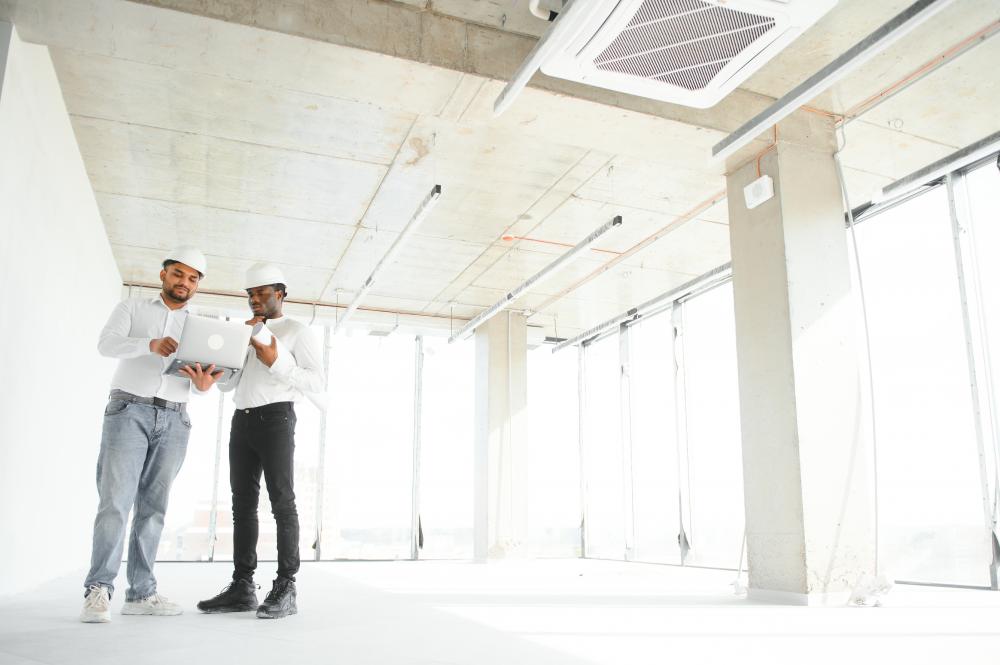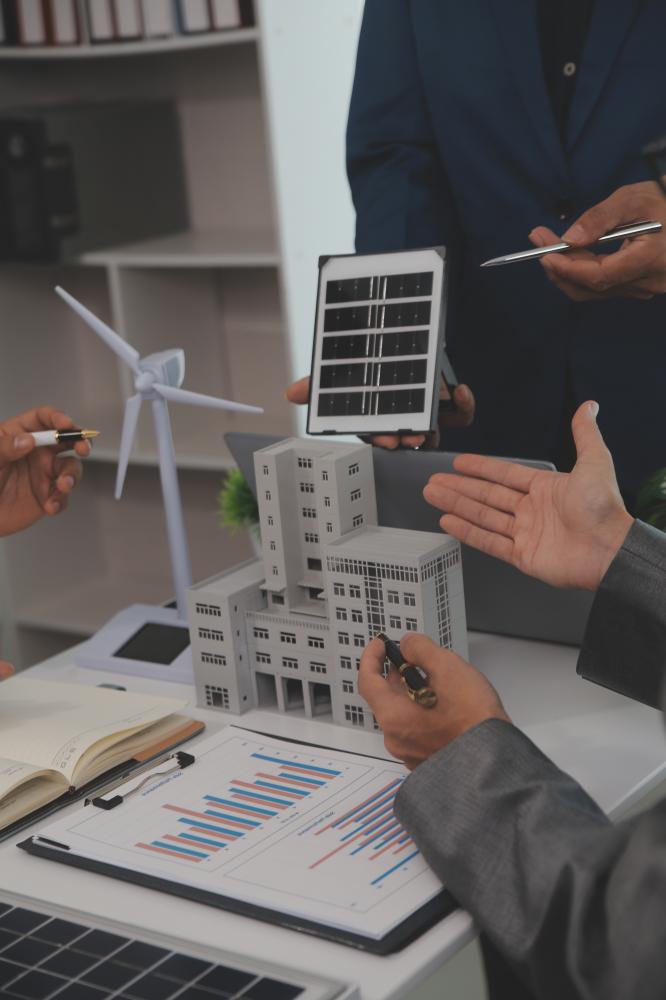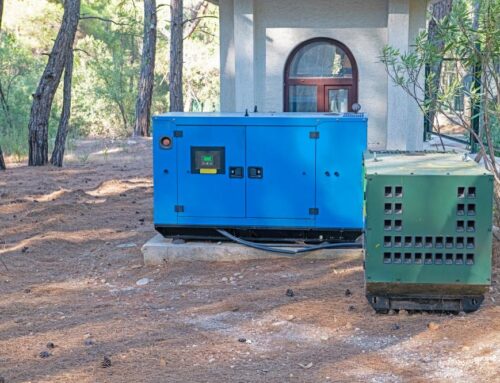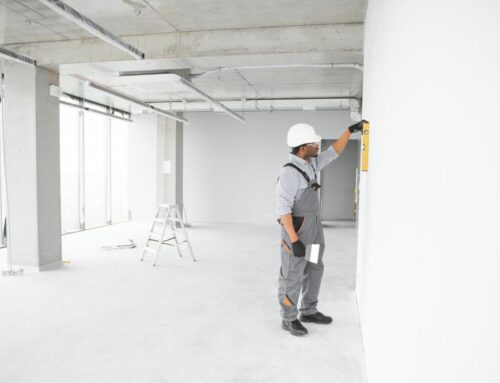
Understanding the Importance of Energy Efficiency
As an electrical service provider, we at Beverly Hills Electrician Pros recognize the vital role energy efficiency plays in business operations. By implementing Energy Efficiency Solutions for Businesses, organizations can reduce costs, enhance comfort, and contribute positively to the environment. Energy efficiency isn't just about saving money; it's about creating sustainable business practices that benefit everyone involved.
Today's businesses face the challenge of balancing operational efficiency with environmental responsibility. Energy-efficient solutions allow companies to address both. By optimizing energy use, businesses can significantly cut down on unnecessary expenditures. This not only improves the bottom line but also helps build a positive brand image.
Energy Efficiency Solutions for Businesses are essential in today's competitive market. Operational costs directly impact profitability, and energy efficiency helps reduce these costs significantly. It allows businesses to reinvest savings into growth initiatives, improving competitive advantage. Moreover, with increasing awareness of climate change, businesses adopting green practices gain favor among environmentally conscious consumers.
Strategies for Achieving Energy Efficiency
Our experience shows that achieving energy efficiency doesn't happen overnight. It requires a strategic approach, starting with identifying areas of waste and inefficiency. Energy audits are an excellent first step. They provide insights into current energy usage and highlight opportunities for improvement.
An effective strategy involves upgrading outdated systems. Replacing old lighting with LED options, optimizing HVAC systems, and incorporating automation technologies can yield significant energy savings. These upgrades not only improve efficiency but also enhance the work environment, contributing to greater employee satisfaction.
Implementing control systems is another strategy. These systems adjust energy usage based on actual need, ensuring no energy goes to waste. Smart thermostats, for example, can regulate heating and cooling based on occupancy, leading to substantial savings.
For businesses hesitant to invest in costly upgrades, financing options are available. These options allow companies to implement Energy Efficiency Solutions for Businesses without upfront capital expenditure, making it easier to take the leap towards sustainability.
Exploring the Benefits of Energy Efficiency
The benefits of Energy Efficiency Solutions for Businesses extend beyond financial savings. By reducing energy consumption, businesses lower their carbon footprint, contributing to a healthier planet. Environmental responsibility is increasingly important to stakeholders, influencing their decisions and perceptions of a company.
Improved energy efficiency also results in better working conditions. Enhanced lighting and ventilation systems create a more pleasant environment, which can boost employee morale and productivity. It's not just about saving energy; it's about creating a space where employees thrive.
Moreover, energy efficiency enhances equipment longevity. Efficient systems experience less wear and tear, reducing maintenance costs and downtime. This reliability can be a game-changer for industries where continuous operation is crucial.
Overcoming Challenges in Implementing Energy Efficiency
Implementing Energy Efficiency Solutions for Businesses can present challenges, from initial costs to resistance to change. Many businesses are reluctant to invest in new technologies or equipment due to budget constraints. However, the long-term savings and environmental benefits often outweigh these initial barriers.
Educating stakeholders on the importance and benefits of energy efficiency is crucial. By understanding potential savings and improvements, stakeholders are more likely to support energy-efficient initiatives. Engaging employees in this process can lead to innovative ideas and strategies, further enhancing efficiency efforts.
Another challenge is the complexity of transitioning to energy-efficient systems. Working with knowledgeable professionals can simplify this process. At Beverly Hills Electrician Pros, we guide clients through each step, ensuring a seamless transition and optimal results.
The Future of Energy Efficiency
Energy Efficiency Solutions for Businesses continue to evolve, with technology leading the way. Innovations such as smart grids, AI-driven systems, and IoT devices hold promise for even greater efficiency. These advancements will further streamline energy management, providing enhanced control and insights.
As technology advances, businesses need to stay informed to leverage the latest solutions effectively. Adapting to these changes ensures companies remain competitive and aligned with sustainability goals.
Ultimately, embracing energy efficiency is about creating a better future. By investing in these solutions, businesses can thrive economically while contributing to a more sustainable world. At Beverly Hills Electrician Pros, we're committed to guiding businesses on this journey, offering expert advice and customized solutions to meet their unique needs.

Understanding Energy Savings
In the world of Commercial Energy Savings, understanding the fundamentals is crucial. Energy efficiency is not just about reducing consumption; it’s about optimizing resources. Our team emphasizes how energy savings directly impact operational costs and profitability. Engaging with energy audits can uncover hidden inefficiencies, enabling businesses to act smarter.
Commercial Energy Savings can transform the financial landscape of any enterprise. By identifying key areas in operations where energy is wasted, businesses can reinvest those savings into core activities. This holistic view makes a noticeable difference in competitiveness and sustainability.
Practical Steps for Energy Conservation
Implementing energy-saving initiatives starts with a thorough energy audit. This initial step in Commercial Energy Savings reveals what systems need upgrading or replacing. At Beverly Hills Electrician Pros, we recommend comprehensive evaluations of lighting, HVAC systems, and electrical panels as starting points.
Another effective measure is retrofitting existing structures with modern, energy-efficient technologies. LED lighting and smart thermostats are two examples that bring quick returns on investment. Additionally, smart building technologies offer real-time energy monitoring, enabling prompt adjustments to energy consumption patterns.
Incorporating renewable energy sources like solar panels significantly boosts Commercial Energy Savings. Not only do they reduce reliance on traditional power grids, but they also provide sustainable energy solutions. Financial incentives and rebates further sweeten the deal, making the transition more appealing.
To simplify the decision-making process, our clients often explore partnerships with financial experts. These collaborations help secure funding and incentives available for energy-efficiency projects, ensuring a smoother transition to sustainable practices.
Financing Energy Efficiency
Commercial Energy Savings can be capital-intensive, but many financing options mitigate this challenge. Government grants, tax incentives, and low-interest loans are just a few ways to support energy-efficient upgrades. We guide our clients in navigating these options to find the best financial pathways.
Beyond traditional financing, Property Assessed Clean Energy (PACE) programs offer unique opportunities. PACE financing allows for energy-efficient improvements to be paid through property taxes over time, spreading the cost and easing the burden on cash flow.
Good financial planning entails evaluating all incentives and rebates available. State and federal programs often provide substantial financial benefits, making energy upgrades more accessible and attractive. In our experience, a well-prepared financial plan can significantly enhance the viability of Commercial Energy Savings projects.
The Role of Technology in Energy Savings
Technology plays an essential role in achieving Commercial Energy Savings. Innovations in energy management systems allow businesses to monitor usage patterns and identify areas for improvement. These systems become more intuitive with advances in artificial intelligence and machine learning, providing actionable insights.
At Beverly Hills Electrician Pros, we embrace technology by recommending smart sensors and automation. These tools reduce energy waste by ensuring that systems operate only when necessary. From daylight harvesting to occupancy sensors, technology enhances efficiency and supports sustainability goals.
Impact of Energy Savings on Business
A commitment to energy efficiency goes beyond reducing consumption. It cultivates a culture of sustainability within an organization. As Commercial Energy Savings initiatives take root, businesses often see improved reputation among environmentally-conscious clients, contributing to brand loyalty.
In the long run, energy savings lead to lower operational costs, which translate into more competitive pricing. It’s no wonder businesses in Beverly Hills seek guidance from experts like us to achieve these savings. Our expertise in Commercial Energy Savings helps businesses thrive financially while also reducing their environmental footprint.
Understanding Business Energy Management
Our approach to Business Energy Management focuses on optimizing energy use at every level. As an electrical service provider, we've learned that effective energy management is foundational to enhancing efficiency. Business Energy Management allows us to identify and implement solutions that minimize wastage while maximizing savings. The integration of technology in this domain helps monitor and control energy usage seamlessly.
With the rapid evolution of energy management systems, businesses can gain significant insights into their consumption patterns. These insights aid in making informed decisions about energy utilization. By adopting Business Energy Management strategies, businesses not only save costs but also contribute to environmental sustainability. The emphasis on efficiency aligns well with the growing demand for greener operations.
The Impact of Energy Optimization
Incorporating Business Energy Management strategies brings tangible benefits. When we conduct energy audits, it becomes apparent how adjustments can lead to substantial savings. For instance, upgrading to energy-efficient lighting and appliances has proven cost-effective for our clients. This approach ensures energy is consumed wisely, reducing unnecessary expenditure.
Our firsthand experiences demonstrate that energy management extends beyond simple cost-saving measures. It fosters enhanced operational efficiency and regulatory compliance. Businesses striving for sustainability find that Business Energy Management plays a pivotal role. Implementing these strategies helps them meet industry standards and environmental regulations.
Technological Advancements in Energy Management
Technology is transforming Business Energy Management. Remote monitoring and IoT devices provide real-time data, allowing businesses to make proactive decisions. The seamless integration of these technologies helps in predicting consumption patterns and preparing for peak demand times.
By employing smart energy systems, businesses can automate controls and optimize energy use. This automation minimizes human error and enhances precision. Additionally, incorporating renewable energy sources becomes feasible, further promoting sustainable practices. We've observed how such advancements streamline operations and ensure efficient energy use.
Our clients often appreciate the flexibility these technologies offer. They gain the ability to adjust energy consumption dynamically, aligning with operational needs. This adaptability is crucial in industries where energy demand fluctuates. Embracing these innovations ensures that Business Energy Management remains efficient and forward-thinking.
Personalized Energy Solutions
At Beverly Hills Electrician Pros, we understand that no two businesses are alike. Business Energy Management solutions must be customized to meet specific needs. Our tailored strategies ensure clients achieve optimal energy efficiency. This customization is vital for addressing unique operational challenges.
We collaborate closely with our clients to design strategies that align with their goals. This partnership ensures that energy management solutions enhance productivity and financial performance. Whether it's upgrading electrical systems or integrating renewable sources, personalized approaches yield the best outcomes.
Our dedication to client-specific solutions also extends to consultation and support. We provide guidance on best practices and emerging technologies. Businesses benefit from our expertise, gaining a competitive edge in energy efficiency. Ultimately, this personalized approach in Business Energy Management fosters long-term sustainable practices.
The implementation of these solutions not only optimizes energy use but also elevates operational standards. Our experience reveals that businesses equipped with customized energy strategies are more resilient and adaptive to industry changes.

What are energy efficiency solutions?
Energy efficiency solutions are strategies or technologies implemented to reduce the amount of energy required to provide products and services. At Beverly Hills Electrician Pros, we see these solutions as essential tools for businesses looking to lower their energy consumption and costs while contributing positively to the environment. Examples range from simple measures like using LED lighting to more complex systems such as smart automation to manage HVAC systems and lighting based on real-time demand. We've found that the key to success lies in conducting thorough energy audits to determine areas of waste and potential improvement opportunities. By tailoring solutions to specific operational needs, businesses not only save on energy costs but also enhance their sustainability profile.
What are 3 ways we could increase energy efficiency?
Increasing energy efficiency in your business can yield substantial savings and environmental benefits. One effective way is to upgrade lighting systems to LED technology, which consumes significantly less energy and has a longer lifespan compared to traditional bulbs. Another approach is optimizing HVAC systems by incorporating smart thermostats that adjust heating and cooling based on occupancy levels—these tools can lead to substantial reductions in energy bills. Finally, investing in building insulation improvements can drastically reduce the energy required for heating and cooling, providing a more comfortable indoor environment. At Beverly Hills Electrician Pros, we've helped many clients implement these strategies and seen firsthand the difference they can make in both cost savings and operational efficiency.
What are the 10 energy conservation ideas?
Energy conservation is about making conscious choices to use less energy. Here are ten ideas that have proven effective: 1. Schedule regular energy audits to identify inefficiencies and areas for improvement. 2. Transition to energy-efficient lighting, such as LEDs. 3. Install programmable or smart thermostats to optimize heating and cooling schedules. 4. Encourage employees to turn off equipment and lights when not in use. 5. Invest in energy-efficient appliances and office equipment. 6. Utilize natural lighting by arranging office spaces to maximize sunlight use. 7. Implement motion sensors for lighting in less frequently used areas. 8. Encourage telecommuting to reduce energy use from travel and office utilities. 9. Upgrade insulation and seal windows and doors to prevent energy loss. 10. Regular maintenance of HVAC systems to ensure they run efficiently. At Beverly Hills Electrician Pros, we believe incorporating these practices can significantly reduce energy consumption, contributing to both economic and environmental benefits for businesses.
What are the 5 components of energy efficiency?
Energy efficiency is built on several key components: 1. **Energy Audits**: These assessments identify current energy usage patterns and inefficiencies, providing a roadmap for improvements. 2. **Efficient Technologies**: Implementing advanced technologies such as LED lighting and smart HVAC systems that use less energy to perform the same functions. 3. **Behavioral Changes**: Encouraging habits like turning off unused equipment or reducing idle time can significantly cut down energy use. 4. **Systems Optimization**: Fine-tuning systems to work at optimal efficiency, for example, by using variable frequency drives on motors to match output with demand. 5. **Renewable Energy Integration**: Deploying systems like solar panels to generate clean energy and reduce reliance on conventional power sources. At Beverly Hills Electrician Pros, we focus on integrating these components into personalized strategies, ensuring our clients achieve maximum energy efficiency. These elements work in harmony, creating a sustainable and cost-effective energy management system.
What are common misconceptions about energy efficiency solutions?
One common misconception is that energy efficiency solutions are prohibitively expensive and only suitable for large corporations. At Beverly Hills Electrician Pros, we emphasize to our clients that many cost-effective solutions exist, and the initial investment often results in significant savings over time. Another misconception is that energy efficiency only benefits the financial bottom line. In reality, it also enhances workplace comfort and boosts employee productivity. Some believe that energy-efficient technologies are complex and difficult to implement, but in truth, many solutions, like switching to LED lighting or installing smart thermostats, are straightforward with the right guidance. Understanding these technologies' broader impacts can help businesses make informed decisions that support long-term sustainability goals.
What are advanced insights on energy efficiency solutions for businesses?
Advanced energy efficiency solutions often involve leveraging cutting-edge technologies like the Internet of Things (IoT) and artificial intelligence (AI) to enhance energy management. These technologies provide real-time data and predictive analytics, allowing businesses to optimize their energy use dynamically. For example, smart sensors can adjust lighting based on occupancy or daylight availability, significantly reducing energy waste. At Beverly Hills Electrician Pros, we've seen clients benefit from integrating renewable energy sources into their operations, not only to cut costs but also to reduce their carbon footprint. Additionally, financing mechanisms such as PACE programs make adopting advanced energy solutions more accessible by spreading the financial burden. By staying informed about these innovations, businesses can stay competitive and aligned with sustainability trends.
What is Business Energy Management?
Business Energy Management (BEM) involves the strategic planning and implementation of practices to optimize energy use within a company. It's not just about reducing energy consumption; it's about managing how energy is used to enhance overall efficiency. At Beverly Hills Electrician Pros, we assist businesses in assessing their energy needs, monitoring usage patterns, and implementing technologies to minimize waste. This process often includes upgrading to energy-efficient appliances, employing automation and smart systems, and considering alternative energy sources. By taking a comprehensive approach to energy management, businesses can significantly lower their operating costs and improve their sustainability credentials, an increasingly important factor for many stakeholders.
What key factors contribute to Commercial Energy Savings?
Several factors contribute to achieving substantial commercial energy savings. The first is conducting a detailed energy audit to identify inefficient practices and areas where improvements can be made. Upgrading to energy-efficient technologies, such as switching to LED lighting or implementing smart building systems, can also significantly reduce energy costs. Another critical aspect is engaging employees in energy-saving practices, such as turning off equipment when not in use or optimizing usage schedules. Additionally, integrating renewable energy resources can provide long-term savings and protection against fluctuating energy prices. At Beverly Hills Electrician Pros, we often work with businesses to explore financing options, such as government incentives and rebates, which can make the transition to more energy-efficient operations more feasible financially.
What steps can businesses take to improve their energy management?
Improving energy management starts with a clear understanding of current energy usage, which can be achieved through an energy audit. This provides a baseline and helps identify areas for improvement. Following this, businesses can implement energy-efficient technologies, such as high-efficiency HVAC systems and smart lighting solutions. It's also beneficial to adopt an energy management system that monitors and controls energy use, providing insights into consumption patterns and helping to identify further efficiencies. At Beverly Hills Electrician Pros, we recommend setting clear energy-saving goals and regularly reviewing progress to ensure these are met. Furthermore, getting buy-in from all levels of the organization, from management to employees, helps foster a culture of sustainability and shared responsibility, which is crucial for the success of any energy management strategy.
#### Resources for Energy Efficiency Solutions- U.S. Department of Energy – This governmental website provides comprehensive resources on energy efficiency programs, technological advancements, and policy guidance to help businesses optimize their energy use and save costs.
- U.S. Environmental Protection Agency (EPA) – The EPA offers information on energy-efficient practices, as well as tools and resources for businesses looking to improve their energy efficiency and reduce their environmental impact.
- ENERGY STAR – Managed by the U.S. Environmental Protection Agency, ENERGY STAR is a program that provides benchmark tools and resources to help businesses implement energy-efficient practices and technologies.
- American Society of Heating, Refrigerating and Air-Conditioning Engineers (ASHRAE) – ASHRAE offers standards, guidelines, and resources on efficient heating, ventilation, and air conditioning practices for businesses aiming to improve energy efficiency.
- U.S. Green Building Council (USGBC) – The USGBC promotes sustainable building practices and provides educational resources, certifications, and tools for businesses seeking to incorporate energy-efficient and sustainable practices.
- National Renewable Energy Laboratory (NREL) – NREL provides research and insights into renewable energy and energy efficiency solutions, offering valuable resources for businesses pursuing sustainable energy practices.




